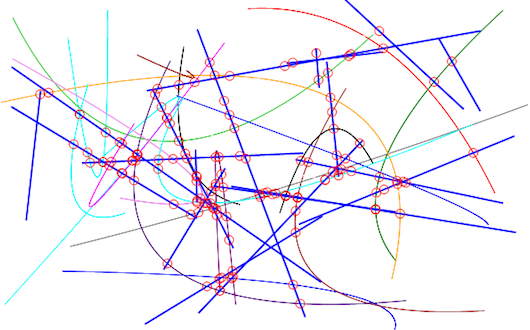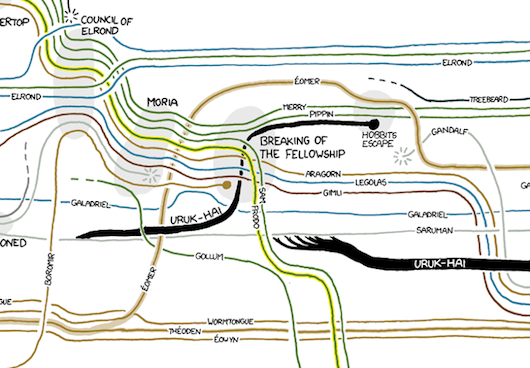I saw Brian Eno and Steven Johnson in conversation on Monday night at the ICA, and Johnson talked about an approach he calls the long zoom or maybe consilience. The invention of air (the subject of his book) must take in the context of the Enlightenment; the energy and machines released by the Industrial Revolution; discussions, letters and social relations; and the shift from alcohol to coffee. All scales interconnect. None determine.
I enjoy these interwoven histories. In Pandora’s Hope, Bruno Latour tells how Pasteur and microbes bring each other to life, buttressed by laboratory experiments and arguments in letters to other scientists. Pasteur, microbes and instruments each have their own capacities to act and collaborate, and it’s only in their actions that we remember any of them; that history is made.
Yesterday morning I had an exciting meeting with a potential cybernetics researcher. I hope it works out. We found tight knots and long arcs: gnosis, McLuhan, Shannon’s information theory, mind/body, and Neuromancer; racism, eugenics, Mead, post-structuralism; prosthetics and body modification.
Listopad
We’re now 20 years after the Prague Revolution of November 1989, that threshold year for modern Europe. It is a tangled history: all views of the events are partial and are often contradictory. No single factor determines. Historical trajectories lasting five decades are as important as lies told to credulous protestors, and as important as an invisible-to-us political game played between the secret police of Soviet Russian and Czechoslovakia. All we can do is tell stories.
The Prague revolution is a history best seen as constructive interference; a kind of aleph moment of trajectories and events; a cloud formation in a particular spot brought about by humidity and foliage and gaps in the clouds, a nest or complex of feedback loops; a self-reinforcing discontinuity.
Some years ago I made a timeline from journals and journalism I could find online. 1989 is right at the beginning of online personal narrative, which is one of the qualities that attracted me. In the end I wrote a story about Martin Smid, the student who didn’t die, but whose death at the hands of the police catalysed the revolution: Listopad, Prague 1989.
I don’t know why I write this. I’m interested in tangles and multi-actor histories, and how you tell stories in them. Books are for the linearisable. Hypertext is for hyperhistories. I’m curious about how simple patterns in behaviours or social relationships somehow persist, complexify and grow over decades and hundreds of thousands of people, and somehow don’t die away.
That’s one of the reasons I’m interested in cybernetics — surely it’s important, the weird individual relationships, the probes into the nature of being human, the mix of countercultural and military-industrial, the attitudes and ideas, all fermenting in the bottleneck population that contributed so much to modern culture? Surely those patterns persisted and weren’t diluted, and will throw light on the here and now? Beginnings matter.


One Comment or Trackback
1. Julian Bleecker said on 7 November 2009...
Promising vectors through this material. I’d be excited to see histories without framing contexts or big boxes that littler things fit in. Something harder and with more subtlety than a simple Dawkins inversion in the style of, the world shaking – “Oh my God! The call is coming from inside the house!” when he tells us we are here for our genes/viruses/and to become alienfood or biofuel for the next occupants. Level the terrain – nothing precedes the thkng it is purported to contain, perhaps – except when editors insist on context and big pictures and such all. Latour’s “clamps” meant to disallow scaling-up are useful, if painful, as I suppose clamps can be (Reassembing the Social if only for the 7th chapter – “the dialogue”). Don’t know, but Paul Edward’s “Closed Worlds” critical history of the Sage Missile System might be useful, and Chris Habbles Gray’s “Cyborg Handbook” too. Follow the circuits and each terminal of the switch and don’t forget Wargames/Dr. Strangelove/Strategic Air Command (Henry Fonda if memory serves)/&c.
Great, gooey stuff!